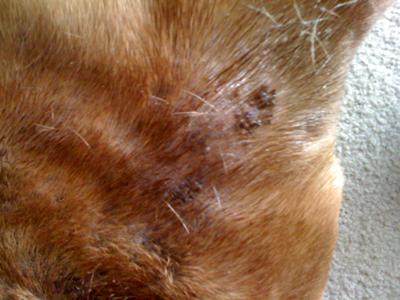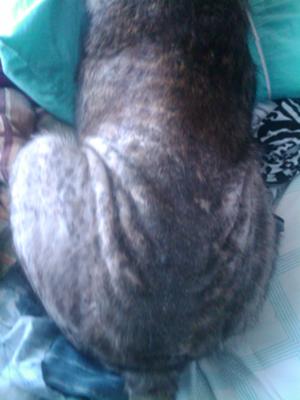Small Black Dog Skin Bumps with Hair Loss
by Pam
(Shelbyville, TN 37160)
My English Bulldog has small black bumps on his back with hair loss in these areas.
I would like to know what it could be. I have put bug balm on this area to help him with the itching and gave him a oatmeal bath.
Editor Suggestions Dog Black Bumps on Skin and Dog Hair Loss
Dear Pam,
Thank you for your question regarding black dog skin bumps and dog hair loss.
The skin is the largest body part. It is exposed directly to many pathogenic (disease causing) factors. It is also affected by internal physiological disturbances as well. Therefore, the development of dog skin bumps, alopecia (hair loss) and itching are relatively non specific symptoms, i.e. many conditions can be characterized by these symptoms.
The condition you described is characterized by itching and the progression of symptoms on the back. Also, in the picture, it seems that the dog skin bumps are hard and crusty, representing a possible parasitic infestation.
Along with aforementioned symptoms, you should watch out for other signs such as pus, changes and an increase in symptoms on the back that are towards the hind quarter and symptoms of generalized illness getting worse over time. All of these symptoms represent some type of infectious/parasitic condition.
Here, we can suggest some preventive and supportive measures, which will surely help to reduce the symptoms you are seeing and which will help to improve overall dog skin health.
First we suggest that you use a quality medicated shampoo, preferably one which contains a combination of natural extracts such as Nutrivet Medicated Shampoo. This will help to
In addition to using a medicated shampoo, you can also add a natural remedy to eradicate any possible parasites (mites etc.) such as Naturasil for Pet Mange in combination with the medicated shampoo. Also, for overall skin health and regrowth of hair, we prefer the use of a natural product such as Skin and Coat Tonic.
Since this condition appears to be related to some type of infectious or contagious cause, for now, you should also clean the kennel, bedding, and environment around the dog to eradicate any pathogenic factors (whether parasites or other microbes). To be safe, wash all clothing and bedding with a quality detergent in hot water, and spray a quality disinfectant made to kill mites in the areas the dog lives with a product such as Benzarid.
By taking these steps, microbial or infectious factors will surely be eradicated and your pet should start to recover in a week or so. But, in case the condition gets worse with time or if you feel there there are some unusual symptoms, its best to consult a veterinarian for a detailed examination and specific treatment, because it can be some serious problem (some underlying systemic disease or tumorous development) that requires immediate attention.
Best of luck to you and your dog. Please keep us up to date on the black dog skin bumps and any improvement in the dog skin condition.
Click here to read or post comments
Join in and write your own page! It's easy to do. How? Simply click here to return to Skin.
Black Spots on Dog Skin
by Margaret
(Perth Western Australia )
My 8 year old Dog, an Australian Silky Terrier has lost her undercoat fur and has small black spots or dots over her skin. The fur loss is mainly around the sides and now is appearing in other places. A while ago she had an episode of a black like dandruff all over her body which took a while to go away, then this was followed by white scaly dog skin.
Can you help with any ideas regarding what this could be? Her fur was once a show coat as she used to be a show dog. She also scratches and bites herself.
Dog Health Guide Editor comment Regarding Black Dots on Dog Skin
Dog skin problems can be of different forms, and are usually identified by some typical signs.
An exact diagnosis can only be made after a detailed examination and laboratory tests. Based on your description, we can only make suggestions based on the symptoms you described.
Your dog seems to be infested with parasites, most probably mites. The development of symptoms on each side of your dog, alopecia (hair loss), itching, chewing and hyper pigmentation suggests a parasitic infestation such as dog mange. Symptoms such as darkened dandruff and then white scales suggest that it is walking dandruff.
Treatment of this condition involves the use of different drugs. An approved and the most effective treatment, is the application of several lime-sulfur dips.
Another way to treat mange in dogs is the use of different prescription drugs as fiprinol, ivermectin etc, but none of them are approved treatments, although they are effective.
Along with a specific treatment, supportive and preventive measures are also required.
You should start by bathing your dog with a herbal shampoo and proceed with several lime-sulfur dips. Both can be purchased online from Naturasil for Pet Mange. Follow the instructions of the manufacturer, which is based on the size of your dog.
For additional support, use a natural remedy such as Skin and Coat Tonic to support your dog's skin health and follicular hair strength. This will help with the alopecia (dog hair loss) treatment.
It is important to interrupt the lifecycle of any parasites that are still alive in the areas where your dog lives in the home. Otherwise, the condition may reappear as mites in the environment and larvae can re infest your dog. You should spray a quality disinfectant in your home and environment that is made for this purpose such as Benzarid. Be sure to treat all areas where your dog roams. Also, wash all of your dog's belongings with a quality detergent and hot water.
Though less important, any mites that infest your dog can cause mild itchiness and redness over human skin. Be sure to handle your dog with care. We suggest you use gloves while handling your dog.
Please keep us up to date on the dog mange treatment and dog black spots on skin problem.
Join in and write your own page! It's easy to do. How? Simply click here to return to Skin.
Dog Mange Black spots
by Ray
(North Attleboro, MA)
I am treating my dog whom I finally got back after "friends were watching him" for 6 months while I was in FLA dealing with family issues, they thought it was an allergic reaction I did some reserch and found out it was mange.
I am treating it with Happy Jack mange medicine, but he has these black spots on his skin, I was wondering if after the mange is gone and his hair grows back if those black spots are gone, just started treatment today, got him back last week.
Editor Suggestion Dog Mange Black Spots
Hi Ray,
I’m afraid I can’t provide too accurate of an idea of what is going on with your dog from your photo, but here are a few general comments.
When a dog’s skin has been irritated for a long time, no matter what the cause, one of the ways that it can respond is with hyperpigmentation -- a darkening of the affected areas. It is a way that the skin tries to protect itself from whatever is going on.
Once the underlying problem is dealt with, the skin will usually return to its normal color, but this can take several months.
If you are on the right track with your treatment, your dog’s skin and coat should start looking better fairly quickly. If this doesn’t happen, please see your veterinarian.
Good luck,
Jennifer Coates, DVM
Click here to read or post comments
Join in and write your own page! It's easy to do. How? Simply click here to return to Skin.
Dog Black Skin , Greasy Coat and Hair Loss
Hi, my golden retriever started off with a raised area on his hind leg. When the vet squeezed it a little pus/blood came out, this was about 3 months ago.
His skin was very pink and scaly, but he now has alot of black skin all over his body. He has lost alot of his coat mostly on his back and hind legs. He is not constantly chewing at his self so I don't think it is irritating him.
His coat was very greasy, but I washed him in medicated shampoo and his coat is alot better. He is 12 years old. he has had 2 courses of antibiotic, but no improvement that I can see.
Any one know what this could be? My vet seemed very vague and just said it could have started as an allergy etc.
Any help would be appreciated.
Editor Suggestion for Treating Dog Skin Problems such as darkening of the skin, dog hair loss and a greasy dog coat
Dog skin conditions, such as hair loss along with a greasy coat and darkening of the skin surface suggests that either the dog is suffering from a fungal infection or is experiencing an underlying endocrinal disorder.
It is possible that your dog is suffering from an endocrinal or hormonal disorder and that the skin lesions such as pus filled lesions occurred as a result of secondary problems, i.e. fungal and bacterial infections.
Here, it should be noted that dog skin problems should be carefully diagnosed through a detailed examination and supportive tests, such as skin scrapings, blood profiles and testing etc. The chances of allergies being the problem cannot be completely eliminated, but it seems that your dog is not suffering from any allergy at all.
The development of the condition suggests that it might have been an allergy and itchiness in the early stages of the condition, but dog skin darkening and reduced itchiness over time suggests that it is caused by a hormonal disorder (which is more common in older dogs, like yours) and secondary problems.
The course of antibiotics though seems ineffective, but it should be remembered that antibiotics have helped your dog combat any secondary infections. The medicated shampoo has helped in improving the condition as well.
Here, we’d recommend that you should go for a detailed endocrinal examination, and in support we suggest that a better approach would be to use a natural medicated shampoo that contains aloe vera such as Top Paw Medicated Shampoo.
Also, natural remedies, can help to improve skin and immune system health. These remedies do not require a prescription, and will help to improve the symptoms you described (dog hair loss, greasy skin, darkening of skin etc). The two we have in mind are Ring-Ex which help to support the immune system and skin health, and Skin and Coat Tonic which promotes hair strength and a glossy coat.
The condition should be treated specifically on the basis of laboratory tests and a detailed examination performed by a qualified veterinarian.
Please keep us up to date on your dogs skin condition.
Click here to read or post comments
Join in and write your own page! It's easy to do. How? Simply click here to return to Skin.


